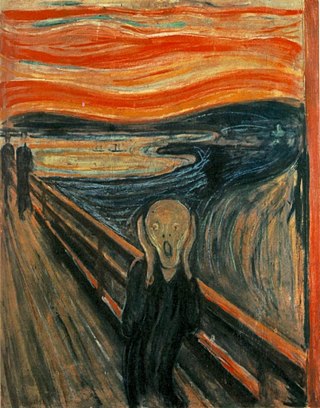
Anxiety is an emotion which is characterised by an unpleasant state of inner turmoil and includes feelings of dread over anticipated events. Anxiety is different from fear in that fear is defined as the emotional response to a present threat, whereas anxiety is the anticipation of a future one. It is often accompanied by nervous behavior such as pacing back and forth, somatic complaints, and rumination.

Cognitive behavioral therapy (CBT) is a form of psychotherapy that aims to reduce symptoms of various mental health conditions, primarily depression, PTSD and anxiety disorders. Cognitive behavioral therapy focuses on challenging and changing cognitive distortions and their associated behaviors to improve emotional regulation and develop personal coping strategies that target solving current problems. Though it was originally designed to treat depression, its uses have been expanded to include many issues and the treatment of many mental health and other conditions, including anxiety, substance use disorders, marital problems, ADHD, and eating disorders. CBT includes a number of cognitive or behavioral psychotherapies that treat defined psychopathologies using evidence-based techniques and strategies.

Major depressive disorder (MDD), also known as clinical depression, is a mental disorder characterized by at least two weeks of pervasive low mood, low self-esteem, and loss of interest or pleasure in normally enjoyable activities. Introduced by a group of US clinicians in the mid-1970s, the term was adopted by the American Psychiatric Association for this symptom cluster under mood disorders in the 1980 version of the Diagnostic and Statistical Manual of Mental Disorders (DSM-III), and has become widely used since. The disorder causes the second-most years lived with disability, after lower back pain.
A mental disorder, also referred to as a mental illness, a mental health condition, or a psychiatric disability, is a behavioral or mental pattern that causes significant distress or impairment of personal functioning. A mental disorder is also characterized by a clinically significant disturbance in an individual's cognition, emotional regulation, or behavior, often in a social context. Such disturbances may occur as single episodes, may be persistent, or may be relapsing–remitting. There are many different types of mental disorders, with signs and symptoms that vary widely between specific disorders. A mental disorder is one aspect of mental health.

Anxiety disorders are a group of mental disorders characterized by significant and uncontrollable feelings of anxiety and fear such that a person's social, occupational, and personal functions are significantly impaired. Anxiety may cause physical and cognitive symptoms, such as restlessness, irritability, easy fatigue, difficulty concentrating, increased heart rate, chest pain, abdominal pain, and a variety of other symptoms that may vary based on the individual.
Post-traumatic stress disorder (PTSD) is a mental and behavioral disorder that develops from experiencing a traumatic event, such as sexual assault, warfare, traffic collisions, child abuse, domestic violence, or other threats on a person's life or well-being. Symptoms may include disturbing thoughts, feelings, or dreams related to the events, mental or physical distress to trauma-related cues, attempts to avoid trauma-related cues, alterations in the way a person thinks and feels, and an increase in the fight-or-flight response. These symptoms last for more than a month after the event and can include triggers such as misophonia. Young children are less likely to show distress, but instead may express their memories through play. A person with PTSD is at a higher risk of suicide and intentional self-harm.
Chronic pain or chronic pain syndrome is a type of pain that is also known by other titles such as gradual burning pain, electrical pain, throbbing pain, and nauseating pain. This type of pain is sometimes confused with acute pain and can last from three months to several years; various diagnostic manuals such as DSM-5 and ICD-11 have proposed several definitions of chronic pain, but the accepted definition is that it is "pain that lasts longer than the expected period of recovery."
Aquaphobia is an irrational fear of water.

Depression is a mental state of low mood and aversion to activity. It affects about 3.5% of the global population, or about 280 million people of all ages. Depression affects a person's thoughts, behavior, feelings, and sense of well-being. Experiences that would normally bring a person pleasure or joy give reduced pleasure or joy, and the afflicted person often experiences a loss of motivation or interest in those activities.

Mental health encompasses emotional, psychological, and social well-being, influencing cognition, perception, and behavior. According to the World Health Organization (WHO), it is a "state of well-being in which the individual realizes his or her abilities, can cope with the normal stresses of life, can work productively and fruitfully, and can contribute to his or her community". It likewise determines how an individual handles stress, interpersonal relationships, and decision-making. Mental health includes subjective well-being, perceived self-efficacy, autonomy, competence, intergenerational dependence, and self-actualization of one's intellectual and emotional potential, among others.
A food addiction or eating addiction is any behavioral addiction characterized primarily by the compulsive consumption of palatable and hyperpalatable food items. Such foods often have high sugar, fat, and salt contents (HFSS), and markedly activate the reward system in humans and other animals. Those with eating addictions often overconsume such foods despite the adverse consequences associated with their overconsumption.
A chronic condition is a health condition or disease that is persistent or otherwise long-lasting in its effects or a disease that comes with time. The term chronic is often applied when the course of the disease lasts for more than three months. Common chronic diseases include diabetes, functional gastrointestinal disorder, eczema, arthritis, asthma, chronic obstructive pulmonary disease, autoimmune diseases, genetic disorders and some viral diseases such as hepatitis C and acquired immunodeficiency syndrome. An illness which is lifelong because it ends in death is a terminal illness. It is possible and not unexpected for an illness to change in definition from terminal to chronic. Diabetes and HIV for example were once terminal yet are now considered chronic due to the availability of insulin for diabetics and daily drug treatment for individuals with HIV which allow these individuals to live while managing symptoms.

Mental health literacy has been defined as "knowledge and beliefs about mental disorders which aid their recognition, management and prevention. Mental health literacy includes the ability to recognize specific disorders; knowing how to seek mental health information; knowledge of risk factors and causes, of self-treatments, and of professional help available; and attitudes that promote recognition and appropriate help-seeking". The concept of mental health literacy was derived from health literacy, which aims to increase patient knowledge about physical health, illnesses, and treatments.

The prevalence of mental disorders has been studied around the world, providing estimates on how common mental disorders are. Different criteria or thresholds of severity have sometimes been used.

Ahmed Okasha is an Egyptian psychiatrist. He is a professor of psychiatry at Ain Shams University Faculty of Medicine, Cairo, Egypt. He wrote books and articles about psychiatry and mental disorders. He is the first Arab-Muslim to be president of World Psychiatric Association from 2002 to 2005.

Depression, one of the most commonly diagnosed psychiatric disorders, is being diagnosed in increasing numbers in various segments of the population worldwide. Depression in the United States alone affects 17.6 million Americans each year or 1 in 6 people. Depressed patients are at increased risk of type 2 diabetes, cardiovascular disease and suicide. Within the next twenty years depression is expected to become the second leading cause of disability worldwide and the leading cause in high-income nations, including the United States. In approximately 75% of suicides, the individuals had seen a physician within the prior year before their death, 45–66% within the prior month. About a third of those who died by suicide had contact with mental health services in the prior year, a fifth within the preceding month.
Masked depression (MD) was a proposed form of atypical depression in which somatic symptoms or behavioural disturbances dominate the clinical picture and disguise the underlying affective disorder. The concept is not currently supported by the mental health profession.
Patricia A. Berglund is a researcher at the University of Michigan's Institute for Social Research. She was included in the 2014, 2015 and 2016 Clarivate Analytics lists of "highly cited researchers" in the fields of psychiatry and psychology.
Katie A. McLaughlin is an American clinical psychologist and expert on how stress, trauma, and other adverse events, such as natural disorders or pandemics, affect behavioral and brain development during childhood and adolescence. McLaughlin is a Professor of Psychology at Harvard University.
Jessie Elisabeth Wells is a New Zealand biostatistician, and is a professor emerita at the University of Otago, specialising in epidemiology and mental health research.









